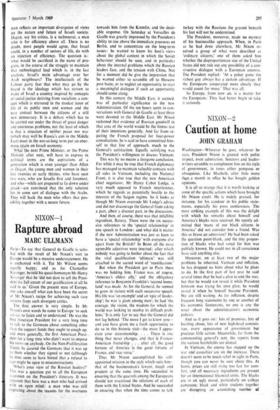Rapture abroad
• NIXON-1 MARC ULLMANN
Paris—To say that General de Gaulle is satis- fied with the result of Mr Nixon's visit to Europe would be a massive understatement. He is enchanted with it. Yet Mr Wilson seems equally happy; and as for Chancellor Kiesinger, he told his quasi-homonym Mr Henry Kissinger that he 'did not dare to tell the Presi- dent the full extent of our gratification at all he said to its.' Given the present state of Europe, one asks oneself what can have been the secret of Mr Nixon's recipe for achieving such rave reviews from such divergent critics.
The first answer is very simple. In Mr Nixon's own words he came to Europe `to seek athice, to listen and to understand:' He was the first American President for a very long time to talk to the Germans about something other than the support funds they ought to cough up, and more generally, the first American Presi- dent for a long time who didn't want to impose his views on anybody. On the Non-Proliferation Treaty he assured the Germans that it was up to them whether they signed or not (although he does seem to have hinted that a refusal to sign might be open to misconstruction).
'What's your view of the Russian leaders?' This was a question put to all the European statesmen on the President's itinerary. It was apparent that here was a man who had arrived ith an open mind: a man who was still cogitating about the reasons for the overtures towards him from the Kremlin, and the desir- able response. On Saturday at Versailles de Gaulle was greatly impressed by the President's ability to rise above the immediate pressures on Berlin, and to concentrate on the long-term issues: he wanted to know his host's views about the global context in which the Soviet behaviour should be seen, and in particular about the internal problems which the Russian leaders face, and the tension with China. Not for a moment did he give the impression that he wanted either to scramble off to Moscow post haste, or to neglect an opportunity to start a meaningful dialogue if such an opportunity should come along.
In this context the Middle East, it seemed, was of particular significance to the new Administration. Of the ten hours spent in con- versations with General de Gaulle at least three were devoted to the Middle East. Mr Nixon reckoned that evidence of Russian goodwill in that area of the world would be the litmus test of their intentions generally. And far from re- jecting the French proposal for four-power consultations, he is said to have committed him- self to that line of approach, much to the General's satisfaction. Equally satisfying was the President's willingness to discuss Vietnam.
This was by no means a foregone conclusion. For while it may be true that French diplomacy has managed to maintain valuable contacts with all sides in Vietnam, including the National Front, it is also true that the new American chief negotiator, Mr Henry Cabot Lodge, is very much opposed to French interference. which he regards as potentially hostile to the interests of the Saigon regime. So it looks as though Mr Nixon overrode Mr Lodge's advice and did not discourage the General from taking a part, albeit a discreet part, in the discussions.
And then, of course, there was that infallible ingredient, flattery. There were the six succes- sive references to the 'special relationship' in one speech in London: and what did it matter if the new Administration was just as keen to have a 'special relationship' with everyone else apart from the British? In Bonn all the most agreeable adjectives were inserted; after which nobody was going to bother about the fact that the vital qualification 'ultimate' was still attached to the sacred word of 'reunification.' But when the President got to Paris there was no holding him. France was, of course, 'America's oldest ally,' and• the obligatory reference to Benjamin Franklin's 'second home- land' was made. As for the General, he seemed to grow in stature with each successive speech.
His life was 'an example' and an 'epic of leader- ship'; he was 'a giant among men'; he had 'the courage, the vision, the wisdom for which the world was looking to resolve its difficult prob- lems.' It is only fair to say that the General did
not lag behind. 'The more I get to know you—
and you have given me a fresh opportunity to do so in this historic visit—the more I appre- ciate your statesmanship. . . . There is one thing that never changes, and that is Franco- American friendship . . . after all, the good fortune of America is the good foftune of France, and vice versa.'
Thus Mr Nixon accomplished his self- appointed mission in the style which suits him : that of the businessman's lawyer, tough and prudent at the same time. He succeeded in ensuring that the quarrels among the Europeans should not overcloud the relations of each of them with the United States. And he succeeded in ensuring that when the time comes to talk turkey with the Russians the ground beneath his feet will not be undermined.
The President, moreover, made no mystery of his businesslike approach. When, in Paris as he had done elsewhere, Mr Nixon re- ceived a group of what were described as 'ordinary citizens,' one of them asked him whether the disproportionate size of the United States did not rule out any possibility of a con- structive dialogue with a European country. The President replied : 'At a poker game the richest guy always has a certain advantage. If the Europeans cooperated more closely they would count for more.' That was all.
So Europe, from now on, is a matter for the Europeans. They had better begin to take it seriously.


































 Previous page
Previous page